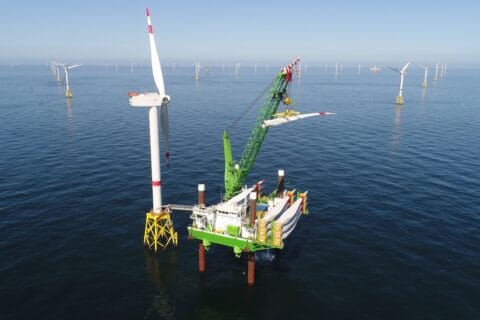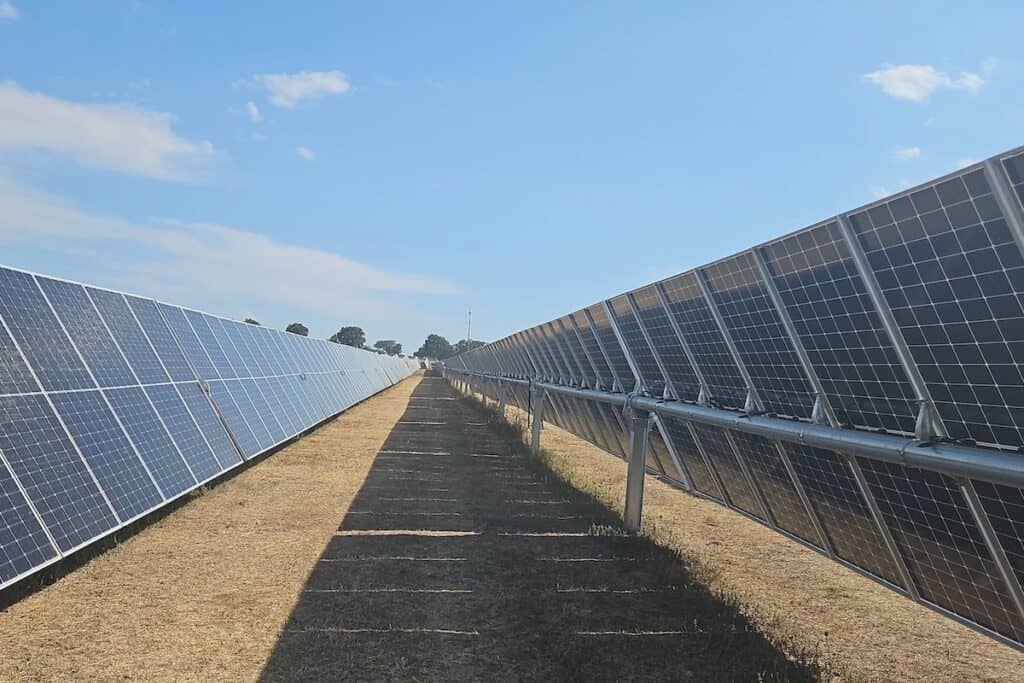
Polling across 15 countries reveals almost unanimous backing from business leaders for the shift away from fossil fuels to renewables, also warning that the majority will relocate if governments fail to act.
Prompting talk of a tipping point in business attitudes, the data shows that 97% of mid-market and large company leaders back a move away from coal and other fossil fuels towards renewable electricity.
In terms of timelines, nearly 78% support the shift to a renewables-based system by 2035 or sooner.
As world leaders scramble to finalise their next round of climate plans in the form of Nationally Determined Contributions (NDCs), the message from business is therefore unequivocal: Renewable energy is the best path to economic growth, energy security, and long-term competitiveness.
The case is clear, says Gonzalo Sáenz de Miera, Director of Climate Change and Alliances at Iberdrola:
“A rapid shift to renewable power and electrification makes strong business sense, ensures energy security and resilience. Enabling policy environments for investment in clean energy, grids and storage; market mechanisms and long-term contracts to provide price stability; and acceleration of permitting for projects will be paramount to this aim.”
The polling was conducted across key economies and emerging markets by data, market research and advisory company Savanta. The research was commissioned jointly by independent climate change think tank E3G, plus non-profit organisations Beyond Fossil Fuels and We Mean Business Coalition.
Embracing today; positioning for tomorrow
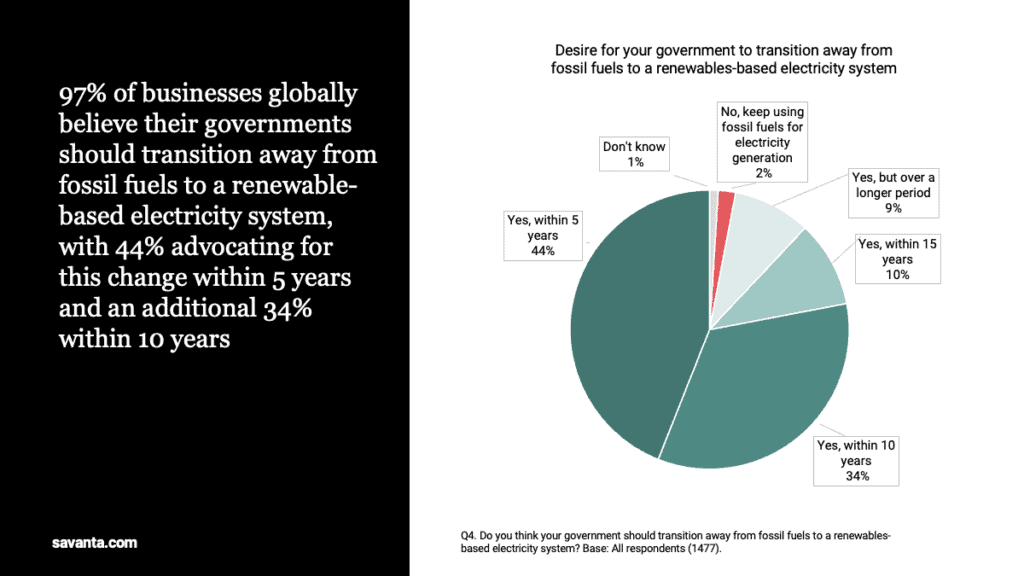
To provide a truly international perspective on opinion, leaders were surveyed in Australia, Brazil, Canada, Germany, India, Indonesia, Italy, Japan, Mexico, Poland, South Africa, South Korea, Türkiye, UK and US.
Worldwide, business is embedding renewables in forward planning and futureproofing, says Stuart Lemmon, CEO EcoAct and Global Head of Practices, Sustainability, at Schneider Electric Sustainability Business:
“Companies embracing renewable energy today are positioning themselves to succeed tomorrow — driving greater competitiveness, accelerating innovation and unlocking long-term cost savings.
“Renewable energy isn’t merely good sustainability practice; it’s an essential strategy for businesses committed to growth, resilience and long-term success.”
From competitiveness to policy
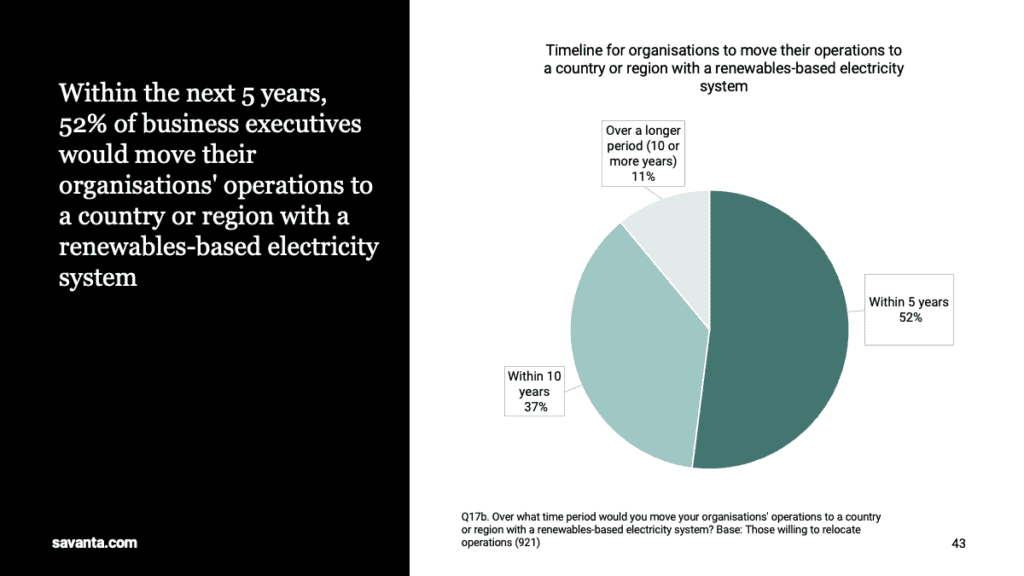
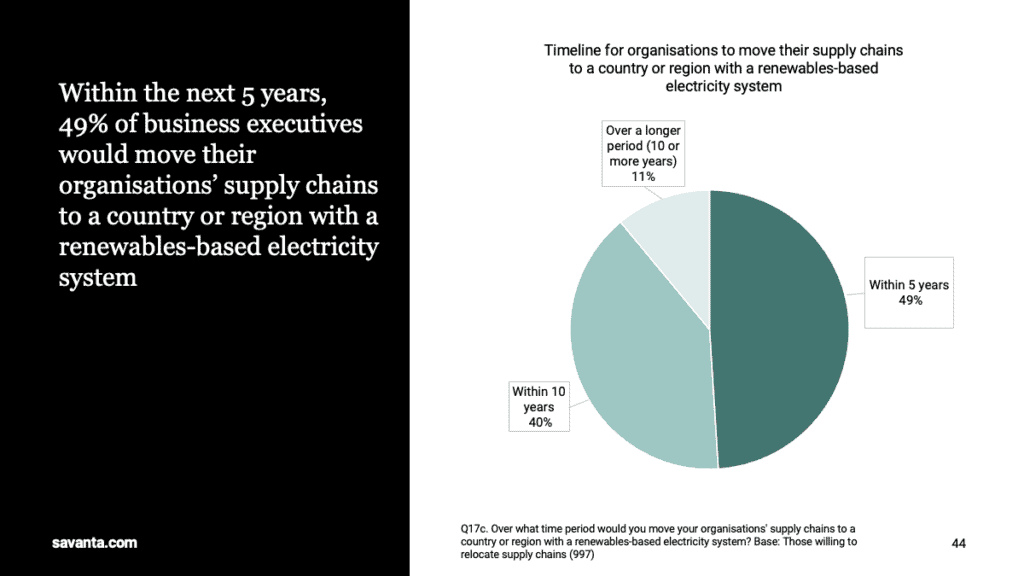
From competitiveness to policy, key findings from the poll include:
- Competitiveness at stake: Half of business leaders say they will relocate their operations (52%) and supply chains (49%) to markets with better access to renewables-based power systems within five years;
- Energy security is paramount: Three-quarters (75%) associate renewables with stronger energy security;
- Economic growth and jobs: 77% link renewables to growth, while 75% see them as key to job creation;
- Swift transition from coal: Nearly nine out of 10 business executives (87%) who want their government to prioritise investment in renewables urge them to stop using coal-fired electricity within the next decade;
- No room for new gas: Two-thirds of executives (67%) want coal phased out and replaced with renewables, grids and storage — without locking in new gas infrastructure;
- Policy is lagging: Despite strong corporate backing, many governments lack clear transition plans.
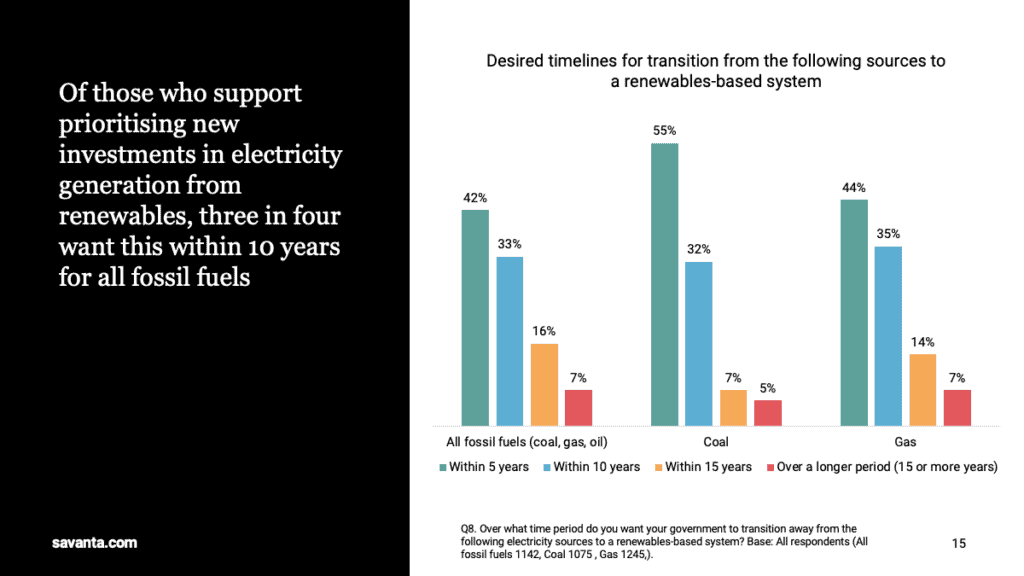
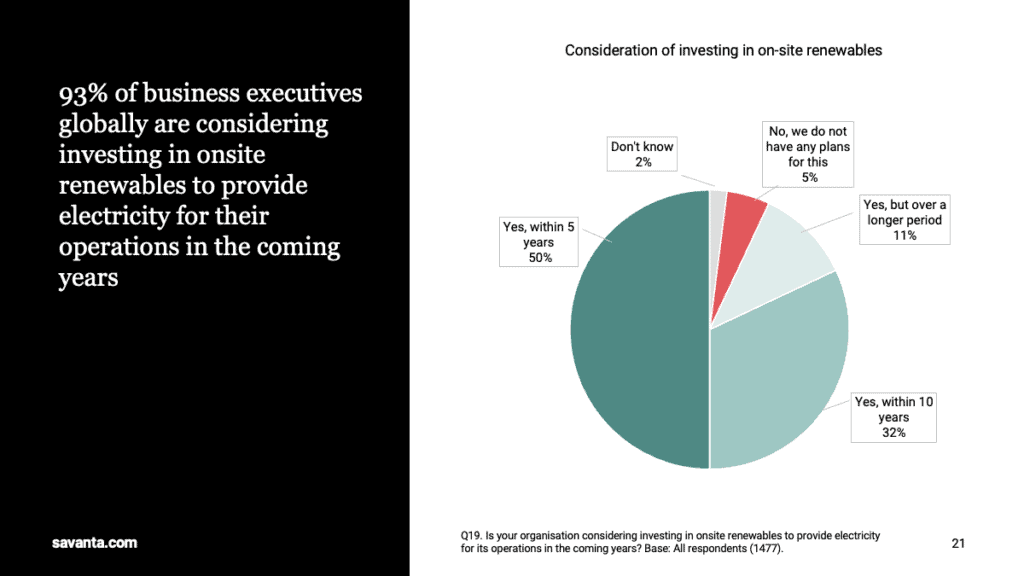
The strength and scale of the findings should embolden governments, suggests Nick Mabey, CEO, E3G:
“In contrast to much political commentary this global poll shows nearly 80% of business executives strongly support a rapid transition in the next decade. Business also wants stronger government policies to facilitate the shift to renewable electricity, access to which is a top priority when deciding where to invest.
“This strong endorsement of the economic and security benefits of renewables should give governments confidence to set ambitious, 1.5 degree aligned NDCs ahead of COP30.”
Corporates and policymakers need to collaborate, says Maria Mendiluce, CEO, We Mean Business Coalition:
“The shift away from fossil fuels is no longer a debate — it is an economic reality, driven by companies that recognise clean energy as the foundation for long-term competitive advantage, job creation, and energy price stability.
“Business leaders are investing in renewables and would like to do more. Their determination to build a clean energy system is a great opportunity for countries to attract investment and growth.
“Governments and companies need to work together, reskilling the workforce to benefit from new jobs.”
Do nothing is not a policy option, adds Claire Smith, Senior International Campaigner, Beyond Fossil Fuels:
“Fossil gas has delivered chaos and losses — business leaders have seen enough. Access to affordable renewable power is now a deal breaker for boardroom strategists. Politicians that fail to transition away from fossil fuels in the next decade won’t just miss out on future investment; they’ll drive business out the door.”
Support across all 15 countries
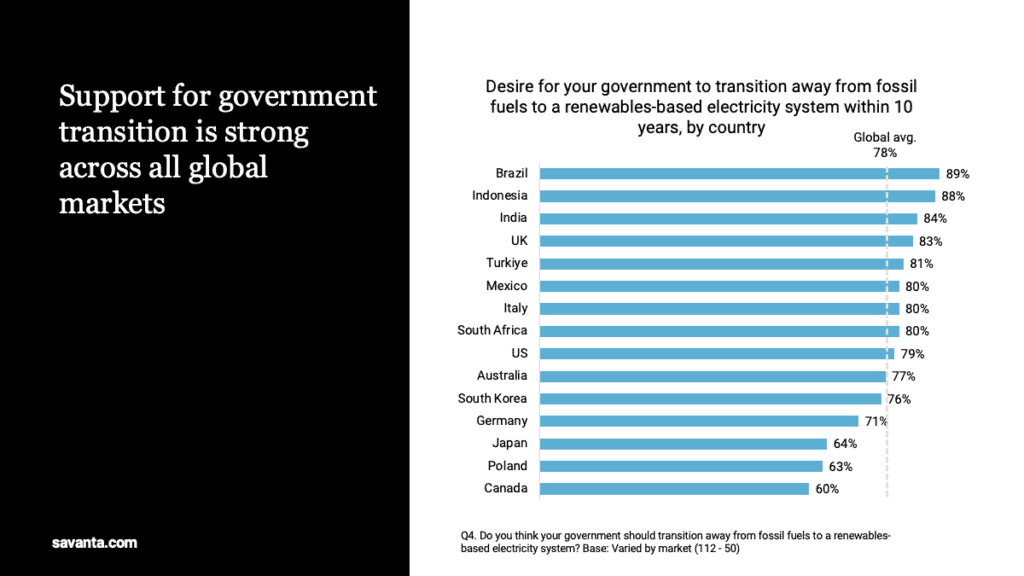
Support for renewables is strong worldwide, with business focused on country-specific priorities:
- Brazil: As the host of COP30, Brazil is under pressure to showcase climate leadership. One of the world’s largest economies, it boasts the lowest share of fossil fuels in its energy mix. A striking 89% of business leaders support shifting away from any remaining fossil fuels to a renewables-based electricity system by 2035. With Brazil’s hydropower sector facing increasing climate-related risks, corporate leaders are looking to wind and solar as the next phase of the country’s energy evolution.
- India and Indonesia: Despite massive coal sectors, 93% of Indian and 94% of Indonesian executives who support new investment in renewables also back transitioning away from coal within 10 years.
- Australia: 60% of executives identified the creation of new jobs as a primary benefit of the transition to a renewables-based power system. If the Australian government fails to transition, more than half (55%) fear organisations will face sluggish economic growth and a deteriorating investment climate.
- Fossil fuel lobbying as a barrier: In Türkiye, where 81% of business leaders polled want a rapid phase-out of fossil fuels and 55% want to see a renewables-based power system by 2030, corporate frustration is mounting over fossil fuel interests blocking progress, with 39% identifying strong lobbying as a barrier.
- The gas challenge: As well as Mexico, Italy and the US, where gas dominates power generation, businesses in South Africa, Indonesia, Canada and Australia want to see governments shift away from coal and invest directly in renewables without moving first to gas.
- Barriers to delivery: In the UK, where business and government have a strong track record in advancing the transition, more than three-fifths of business executives (62%) see energy security as a benefit from transitioning away from fossil fuels to renewables. Almost one third (32%) also feel the delays in obtaining permits for renewable energy, storage or grid infrastructure projects is a barrier
- In South Korea, 43% want to see accelerated planning and investment into modernising the grid.
- Poland: A rapid exit from coal has the strong support of business leaders surveyed — especially those who favour the government prioritising renewables when investing in new electricity generation projects, more than four-fifths (81%) of whom want to see zero electricity from coal within the next 10 years.
Clear mandate for policymakers
The findings present a powerful mandate for policymakers, with businesses highlighting the need for:
- Clear incentives for renewable energy projects, including financing mechanisms and tax credits;
- Robust roadmaps for national transition, ensuring that the shift is both rapid and strategic;
- Investible NDCs that provide thought-through policy frameworks for the phase out of fossil fuels and upscaling of renewables, that in turn offer long-term stability for corporate decision-making; and
- Workforce retraining and job creation, particularly in coal-heavy economies, to ensure a just transition.
In response, Alice Steenland, Chief Strategy, Sustainability and Marketing Officer, Signify, says:
“We’re already moving away from fossil fuels and sourcing electricity from renewables, while increasing the energy efficiency of our lighting products. This combination – renewables plus energy efficiency – will reduce carbon emissions, lower costs for households and companies, and create millions of local, clean energy jobs.”
The time is now, concludes Fernanda Facchini, Head of Climate Change and Circular Economy, Natura:
“We believe the energy transition is urgent and non-negotiable. It needs collaboration. We’ve made a lot of progress through our climate transition plans, and we are working with our suppliers to help them shift from fossil fuels to clean energy. We need to be on the right side of history, and the action is now.”
Savanta is a leading global research and advisory company specialising in delivering evidence-based insights to drive positive change. Savanta is a member of the British Polling Council (BPC) and abides by its rules.
E3G is an independent climate change think tank. It works on the frontier of the global climate landscape, tackling barriers and advancing solutions, to translate climate politics, economics and policies into action.
Beyond Fossil Fuels is a collective civil society campaign committed to ensuring all of Europe’s electricity is generated from fossil-free, renewable energy by 2035. It builds upon the Europe Beyond Coal campaign.
We Mean Business Coalition is a group of seven nonprofit organisations: BSR, CDP, Ceres, Climate Group, CLG Europe, The B Team and WBCSD. Together, they work to catalyse business and policy action to halve emissions by 2030 and accelerate an inclusive transition to a net-zero economy.
Further Reading:
- More on the full poll findings Powering up: Business perspectives on shifting to renewable electricity;
- More about data, market research and advisory company Savanta;
- More about independent climate change think tank E3G;
- More about Beyond Fossil Fuels, a collective civil society campaign;
- More about We Mean Business Coalition, the group comprised of seven non-profit organisations;
- Also on SustMeme, Investment in renewables falls short of 2030 goal;
- Also on SustMeme, Record, but inequitable, growth in renewables;
- Also on SustMeme, Energy transition to add 40 million jobs by 2050;
- Also on SustMeme, Call to invest $35 trillion in transition tech by 2030;
- Also on SustMeme, Is the global energy transition starting to stall?
Check out the full archive of stories on the SustMeme Business & Finance Channel, now available to Sponsor.


